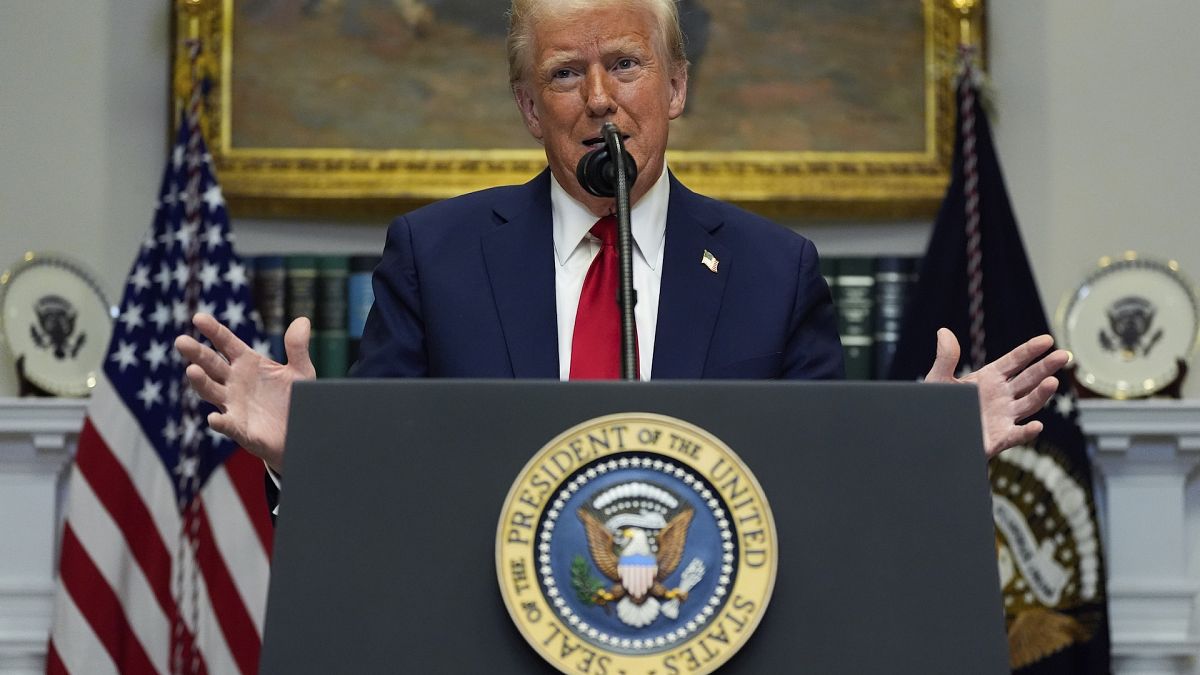Trump unveils multi billion dollar plan to fund AI infrastructure

US President Donald Trump announced billions of dollars in AI investments, collaborating with major tech companies, which led to a surge in their share prices. However, energy prices continued to decline due to concerns about increasing US production.
President Trump has teamed up with tech giants to accelerate the United States’ advancements in artificial intelligence, aiming to enhance its leading position in the global technology race, particularly against China.
On Tuesday, US President Donald Trump announced a joint venture, named Stargate, with OpenAI, Oracle and Softbank to invest billions of dollars in artificial intelligence infrastructure in the country.
The Stargate project
The plan was unveiled by President Trump at the White House, joined by Softbank CEO Masayoshi Son, OpenAI CEO Sam Altman and Oracle co-founder Larry Ellison.
The joint venture team will set up a separate company, deploying $100bn (€96bn) immediately and increasing the investment up to $500bn (€480bn) over the coming four years.
Microsoft, Nvidia, and Arm are also expected to join the venture according to OpenAI’s post. Arm, Microsoft, NVIDIA, Oracle, and OpenAI are the key initial technology partners.
“The buildout is currently underway, starting in Texas, and we are evaluating potential sites across the country for more campuses as we finalise definitive agreements,” OpenAI stated.
Concerns about sustainability
However, the energy-intensive nature of AI infrastructure has raised concerns about sustainability. According to the US Energy Information Administration (EIA), the rapid growth of data centres could strain local power grids.
Unlike his predecessor Joe Biden, who championed clean energy for tech projects, Trump is expected to prioritise fossil fuel production under his “drill, baby, drill” policy, signalling a departure from renewable energy subsidies.
Trump’s aggressive push to expand AI capabilities contrasts sharply with the EU’s more restrictive regulatory environment.
Strict safety and privacy laws have slowed AI model development in Europe, prompting companies like Apple and Meta to limit the availability of their latest technologies in the region.
Reaction from the market
The announcement sent tech stocks soaring. Oracle’s shares rose 7.2% on Nasdaq, and Softbank saw a 9.3% jump in Tokyo trading.
Nvidia climbed 2.3%, and Arm gained 4%, while Microsoft dipped slightly by 0.12% amid concerns over its standing with OpenAI.
In contrast, European tech stocks displayed mixed performances.
By contrast, shares of Europe’s symbolic AI chip equipment maker ASML slid 2.1%, while the largest tech company, SAP’s stock gained 0.3%.
Global equity markets responded positively to the news, buoyed further by Trump’s moderated tariff plans.
He said he considered a 10% tariff on China instead of 60% as previously indicated.
The Dow Jones Industrial Average surged more than 500 points, or 1.24%, while the Euro Stoxx 600 index rose 0.4%. Germany’s DAX extended the six-day winning streak, reaching a new record high.
On the other hand, energy prices slid on expectations that Trump’s policy would boost US energy production, with the AI investment plan likely adding to the downside movements.
The WTI crude futures fell more than 2%, extending the fourth consecutive trading day losing streak. Natural gas futures declined 4.9%, down for the second straight session.
Falling energy prices have weighed oil and gas producers’ stocks in the US and the EU.
In currencies, the euro rose slightly against the dollar to stay above 1.04 for nearly one month.
Related
EU denies picking on US tech giants, says US also…
BRUSSELS (Reuters) - Europe's new tech rule aims to keep digital markets
€450M to drive green data infrastructure, the next startup hub,…
This week we tracked more than 70 tech funding deals worth over €1.3 billion, and over 5 exits, M&A transactions, rumours, an
European tech sector poised for stronger 2025, says Monument Group;…
Let’s kick things off with tech! Monument Group’s Zac Williams expects a big spike in European technology deals in 2025, as the region offers more appealing
Women still marginalised in Europe’s Tech Ecosystem
European startups founded or co-founded by women raised €10.2B in 2024 across nearly 2,000 transactions, according to Pitchbook’s latest study. This repr










